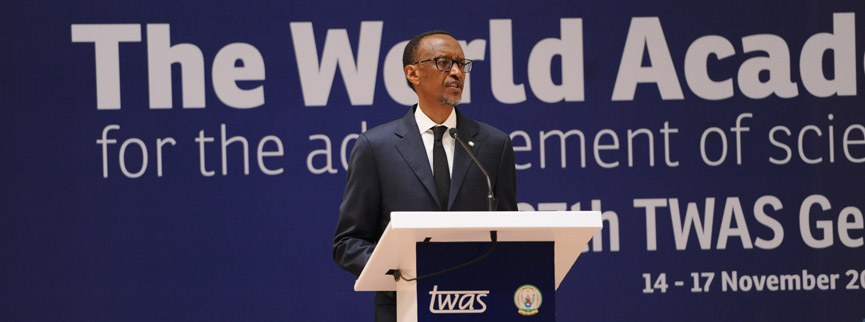
Let me welcome you to Rwanda.
It is a great pleasure to join you today to open this important meeting bringing together scientists and engineers from around the world.
Let me start by thanking you for the medal that has been awarded. It honours all the Rwandans whose hard work has got our country to where it is today.
Allow me also to congratulate the prize winners just announced for their outstanding contributions to science. Your work will certainly make lives better.
Throughout history, humankind has relied on science to find practical solutions to its challenges.
In the developing world in particular, science plays a critical role in our socio-economic transformation by helping to narrow the gap between us and the more developed regions.
This is what has driven Rwanda’s focus on science and technology over the last two decades, even when some might have thought that we had more important things to worry about.
The focus has always been about opening up to the wider world and finding a pathway to understand our situation, identify the best tools available to us and then use that knowledge to reach our full potential.
For any country, achieving a comprehensive vision while also getting into a position to contribute to global solutions depends on several factors.
First, is investment in the necessary institutional and academic infrastructure, as well as in the people, who ultimately are both the drivers and consumers of scientific work.
Second, is collaboration and partnership both among scientists and between policy-makers and researchers.
The World Academy of Sciences is an excellent example of collaboration at both levels, as well as a clear demonstration of the power and relevance of increased South to South cooperation.
The third factor is research. Strengthening scientific research capacity has never been more urgent, particularly on our continent, where it can have a transformational impact on the pace and quality of development.
In Rwanda, we want to do our part.
This is why we have established the Rwanda Academy of Science to promote and support the role of science in sustainable development and to provide evidence-based solutions to leaders at all levels.
We greatly value the partnerships our country enjoys in various fields, to strengthen our national and regional knowledge systems and find innovative solutions to the challenges and opportunities that we all face.
Rwanda is honoured to host several important Centres of Excellence, among them the regional UNESCO Abdus Salam International Centre for Theoretical Physics.
A few years ago, our Government invited Carnegie Mellon University to provide graduate education in ICT because of its strong tradition of research and scholarship. Today, CMU Rwanda forms the core of our Kigali Innovation City.
We have also partnered with the Massachusetts Institute of Technology to create a world-class global climate observatory.
Other centres of excellence have been established in fields as diverse as biomedical engineering and e-health, the internet of things, energy for sustainable development, data sciences, and innovative math and science teaching.
Rwanda will continue to provide an enabling environment and the support required for the success of these partnerships.
There is still a lot of work to be done on our continent and beyond.
Investment in research and development in Africa, and other developing areas, is still too low. In most countries, less than one in three scientific researchers are women. And our continent urgently needs to produce many more scientists and engineers generally.
That is why the Partnership in Applied Science Engineering and Technology initiative, to train 10,000 PhD-level researchers and multiply the number of applied science, engineering and technology students, is absolutely critical.
We recognise that doing this requires significant resources. Governments must do our part while making it attractive for private sector to get involved as a beneficiary of innovation ecosystems.
The transformative power of science is known, and we must harness it to serve our ambitious goals for sustainable development and prosperity.
But science has another, less visible, but no less valuable, dividend.
The scientific mindset makes us better people. In both conception and utilisation, scientific work is blind to divisions or prejudices, that only hinder further progress for everybody.
Our common dignity as human beings matters. And no one can be left out of the scientific enterprise.
Before I end my remarks, I want to thank you for the partnerships with all of you, and with the governments of Italy and Sweden, represented here by the previous speakers.
Once again, we are very happy to host The World Academy of Sciences and thank you for choosing to meet here in Rwanda.
I wish you productive deliberations.
Thank you.

